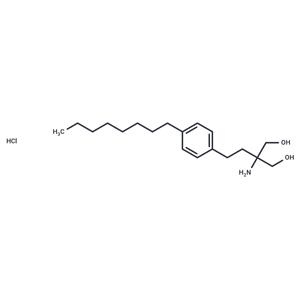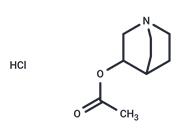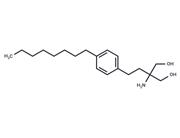| Name | Fingolimod hydrochloride |
| Description | Fingolimod hydrochloride (FTY720) , a novel immune modulator, is a sphingosine 1-phosphate (S1P) antagonist (IC50: 0.033 nM in K562 and NK cells). |
| Cell Research | DCs or NK cells were incubated at a cell concentration of 1 × 10^6 cells/ml with either media or with 2 μM S1P, 10 nM SEW2871, 10 nM FTY720 or their combinations. DCs were also incubated with 1 μg/ml LPS. After 24 h incubation, the cells were harvested and the cell suspensions were centrifuged at 1,000 × g for 10 min before the supernatants were collected. Detection of the levels of various cytokines and chemokines was carried utilizing the Multi-Analyte ELISArray Kit as described by the manufacturers' user manual [1]. |
| Animal Research | This study was carried out on 2-month-old male C57BL/6J mice or sphingosine kinase-2 deficient (SPHK-2?/?) mice weighing 25–30?g, receiving a standard diet and water ad libitum. C57BL/6J wild-type or SPHK-2?/? mice received i.p.-injections of LPS (9?mg/kg)/PepG (1?mg/kg) or its vehicle (0.9% saline). Sham mice were not subjected to LPS/PepG but were otherwise treated in the same way. At 1?h after LPS/PepG challenge, mice were treated with FTY720 (0.1?mg/kg i.v.) or its vehicle (10% DMSO). To elucidate the role of different S1P receptors in the observed effects of FTY720, mice received (45?min after LPS/PepG and 15?min prior to FTY720) the selective phosphatidylinositol 3 (PI3)-kinase inhibitor LY294002 (0.3?mg/kg i.v.) or the selective S1P2 receptor antagonist JTE 013 (1?mg/kg i.v.) or (1?h after LPS/PepG) the selective S1P1 receptor agonist SEW2871 (1?mg/kg i.v.) or vehicle (10% DMSO) [3]. |
| In vitro | The cultures of K562 and NK cells were incubated in the presence of 2 μM S1P and increasing concentrations of Fingolimod (FTY720). Addition of various concentrations of FTY720 blocked the inhibitory effect of S1P with an IC50 value calculated at 0.033 nM. The combination of S1P with FTY720 did not affect the expression of these molecules on the surface of iDCs. In addition, 10 nM FTY720 when incubated alone exerted no effect on the expression of co-stimulatory molecules [1]. FTY720 was able to reduce excitotoxic neuronal death in vitro. FTY720 negatively modulates p38 MAPK in LPS-activated microglia, whereas it had no effect on JNK1/2 activation [2]. |
| In vivo | Administration of the immunomodulator FTY720 increased serum S1P, improved impaired systolic contractility and activated the PI3K-pathway in the heart. Cardioprotective effects of FTY720 were abolished following administration of an S1P receptor 2 (S1P2) antagonist or a PI3K inhibitor. Sphingosine kinase-2 deficient mice had higher endogenous S1P levels and the LPS/PepG-induced impaired systolic contractility was attenuated in comparison with wild-type mice [3]. Using human ALL xenografts in NOD/SCIDγc(-/-) mice, three Ph(+) human ALL xenografts responded to FTY720 with an 80 ± 12% reduction in overall disease when treatment was commenced early. In contrast, treatment of mice with FTY720 did not result in reduced leukemia compared to controls using four separate human Ph(-) ALL xenografts [4]. |
| Storage | Powder: -20°C for 3 years | In solvent: -80°C for 1 year | Shipping with blue ice/Shipping at ambient temperature. |
| Solubility Information | 10% DMSO+40% PEG300+5% Tween 80+45% Saline : 2 mg/mL (5.82 mM), Sonication is recommended.
H2O : 34.4 mg/mL (100.02 mM), Sonication is recommended.
DMSO : 50 mg/mL (145.38 mM), Sonication is recommended.
|
| Keywords | TRPVChannel | TRPV Channel | Trpm7 | TRPChannel | TRP Channel | S1PReceptor | S1P Receptor | S1P | PAK | p21 activated kinases | LPLReceptor | LPL Receptor | LPL | FTY-720 | FTY720 | FTY 720 | Fingolimod |
| Inhibitors Related | (+)-Camphor | Rosiglitazone | Caffeic Acid | Oleoyl Serotonin | (-)-Menthol | Camphor | Probenecid | Nonivamide | Pregnenolone | 1,4-Cineole | 5-Aminosalicylic Acid | Methyl salicylate |
| Related Compound Libraries | Failed Clinical Trials Compound Library | Anti-Neurodegenerative Disease Compound Library | Bioactive Compound Library | Pain-Related Compound Library | EMA Approved Drug Library | Anti-Viral Compound Library | FDA-Approved Drug Library | Natural Product Library for HTS | FDA-Approved Kinase Inhibitor Library | Immunology/Inflammation Compound Library | GPCR Compound Library | Ion Channel Targeted Library |

 United States
United States






